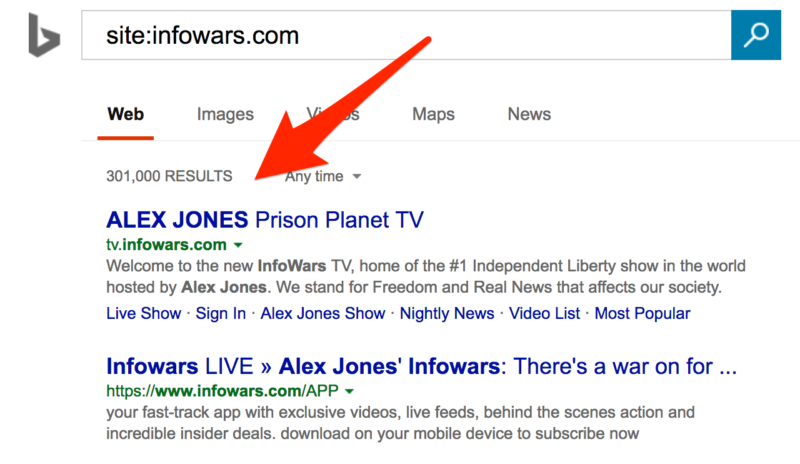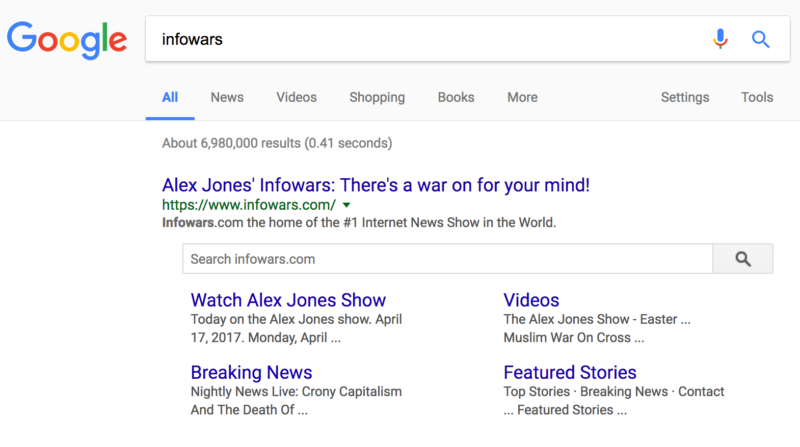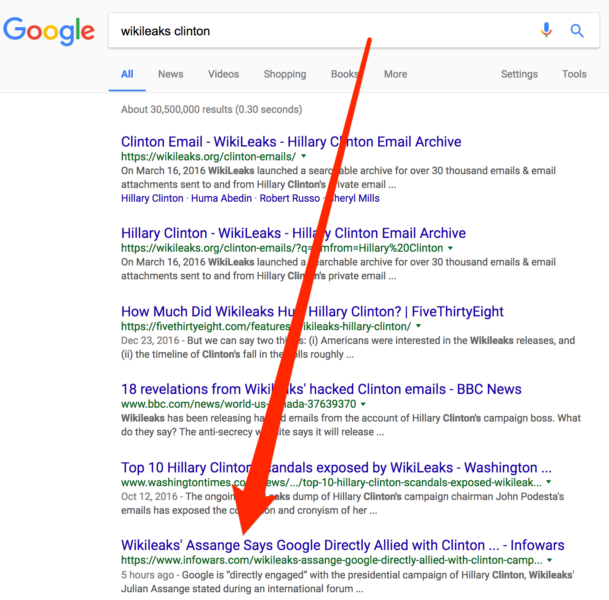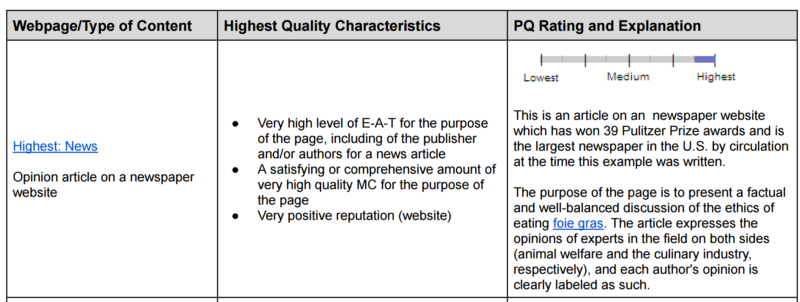Google did not ban Infowars; did rescind quality example using an Infowars article
Infowars article was used to help illustrate how quality raters might judge content, but raters have no power to censor, ban or penalize pages.

Google has neither censored nor banned the Infowars site, despite what some headlines out there say. The company did, however, rescind an example that its quality rater contractors received using Infowars and other sites in terms of how to judge page quality generally.
Memorandum has a roundup on the news, including a Business Insider take that gets the situation generally right.
The news came from Mike Cernovich’s blog, which gets it incorrect with a headline saying “Google Takes Out Major Contract to De-List InfoWars from Its Search Index.” Infowars itself gets it similarly incorrect with its headline of “Breaking: Google Admits To Censoring Infowars, Claims It Will Stop.”
Infowars not delisted or banned
Let’s get the censorship debunking out of the way first. Google currently has indexed about 341,000 pages from Infowars:
If Infowars had been delisted, all these pages would not be there. Nor do the Cernovich or Infowars reports suggest that Google somehow suddenly restored all these pages in the day or so since all this developed. By the way, Google has indexed more pages from Infowars than Google rival Bing, which has 301,000:
Search for Infowars by name on Google, and it ranks tops:
Search for something like “Google censorship,” and Infowars is in the top results:
The same is true for a search on “wikileaks clinton,” as shown below:
The site’s story claiming Israel had a role in the 9/11 attacks also ranks in the top results for a search on that topic:
These are not examples that would happen with a site that was delisted or censored.
Google’s quality raters & what they do
So what did happen? We have to start first with Google’s “search quality raters.” It has about 10,000 of these that it contracts with to perform search quality evaluations. Those raters are asked to perform a huge number of searches and then rate the quality of results they get back.
Those quality raters do not have the ability to ban, delist, censor or penalize any particular listing or site. This is what Google says. It’s also something I’ve never seen reported to happen by the army of independent search engine optimization professionals out there — and believe me, they’d scream about that.
Only Google employees can ban a site or pages from a site. When Google employees take such a specific “manual action,” the site impacted gets a notification — something that Infowars has not said that it received.
Instead, the data from the quality raters is used to broadly change Google’s search algorithms, the recipes that help Google decide what, from the billions of pages it gathers from across the web, to list for particular searches. Those algorithms do not target specific sites. However, sites that are deemed to match certain criteria, such as low-quality content or piracy, can be impacted by them.
Infowars cited in example to quality raters
To perform quality evaluations, quality raters are given guidelines. These are public; you can read them yourself here. They are filled with examples of various pages and guidance on potentially how these might be evaluated, as a way for the raters themselves to make their own general decisions with the searches they do. They do not contain instructions saying that any particular site or sites should always be poorly rated.
In addition to these guidelines, it appears that the vendor or vendors that Google hires to manage these quality raters may give additional instructions — and that’s where all of the current concern comes in. One of these vendors used Infowars as an example, and Cernovich was sent a screen shot of this example, which you can see on his blog.
Infowars was used as an example of how a rater might judge a page’s quality generally. The example gave reasons why the page might earn a “Low to Medium” score, putting it midway to below-average on the quality scale.
Here’s how that looks on Google’s overall page quality scale, from Google’s official guidelines:
The reasons for a lower score were mainly due to the reputation Infowars has overall for “controversial, often debunked claims.” Despite this, the example did not suggest that the page get the lowest possible score. In fact, it explained why this should not happen and even defended the reason why that particular page would be useful to some Google searchers:
Simply presenting an unorthodox perspective on the news doesn’t exactly qualify, even if it may be “harmful” in the larger, more elliptical sense of the term. You could say that we’re being generous with the upper range here, but the site may be considered useful to some users looking for an alternative source of information redeems [sic] it in some small way.
Those are not instructions telling quality raters to delist or censor Infowars, even if they had the ability to do so. Nor are they explicitly saying, as Cernovich wrote, that all Infowars pages must be rated “low quality” or “low to medium.” In fact, the instructions make it clear that raters should take many things into account when rating any page:
Remember that all news organizations that have existed long enough have courted their share of controversy and mistakes. What we’re asking you to do here is to ensure that the line between reliability and outright negligence of facts is honored when you apply your best rating judgement.
That comes after a comparison of this particular article to a similar one at CNN. It cites elements that the CNN article has that the Infowars article lacks as part of the reasoning for the lower rating for Infowars. Potentially, a different Infowars article might rate higher depending on its particular merits.
To recap: no call to ban. No call to delist. No call to censor. None of which the quality raters could do. There’s not even an explicit call to mark all Infowars pages of “low” quality.
Google rescinds the example
While there’s no censorship involved here, Google has said the specific example shouldn’t have been given by its vendor. It sent Search Engine Land this statement:
In our Search quality guidelines for raters, we do not give guidance on how to rate websites in general, but rather give broad guidance on how to evaluate the quality of specific Search result pages. Our intention is to get unbiased feedback from raters in order to inform algorithmic improvements.
In this instance, we have confirmed that a vendor we work with sent out more detailed instructions to some raters without our knowledge, which included references to specific sites. This is in conflict with the intent of our guidelines and the vendor has taken action to remove these references in their training module.
Google’s statement makes no mention of lifting a ban or censorship on Infowars because, of course, the example itself didn’t say this should happen, nor could quality raters make such a thing happen.
Oddly, however, giving specific examples is not in conflict with the “intent” of Google’s own guidelines. As mentioned earlier, those guidelines are full of examples, like this about a Wall Street Journal article used to illustrate a page that might get a high rating:
Or this about a TMZ article that might be deemed to have poorly met a user’s expectations because it is stale:
Suffice to say, the TMZ example has been in the official guidelines for ages and no one has interpreted that as being Google is saying that TMZ should be censored, banned or delisted.
Google’s search quality challenge
Actually, the real worry for Infowars and any site with content that may seem “upsetting or offensive” to a wide variety of searchers is from a completely different and new part of the guidelines that were added last month.
Google launches new effort to flag upsetting or offensive content in search is our story about that. But as that story notes, any content flagged that way doesn’t get an immediate demotion nor a ban. Again, quality raters can’t do that. It’s more data for the search algorithms to use.
Google hopes to change those algorithms so that they’re more likely to show highly trustworthy and factual information for common topics. If the algorithm can detect content deemed suspect, that might be less likely to show. But such content wouldn’t be removed overall and would show for more specific searches.
None of this may change the minds of those on the right convinced that Google — a generally left-leaning company — is out to censor its results. But then again, last month Google was also accused of actively promoting climate change denial and last December accused of prioritizing sites with a right-wing bias. Both were untrue.
So which is it? Is Google purposely slanting right or left? The answer is neither. Instead, with billions of pages indexed and billions of searches happening each day, people can interpret results to lean however they want.
For more on that and Google’s struggle as the examination of its search results become more polarized, see my article from earlier this month: A deep look at Google’s biggest-ever search quality crisis.
Contributing authors are invited to create content for Search Engine Land and are chosen for their expertise and contribution to the search community. Our contributors work under the oversight of the editorial staff and contributions are checked for quality and relevance to our readers. The opinions they express are their own.
Related stories
New on Search Engine Land








